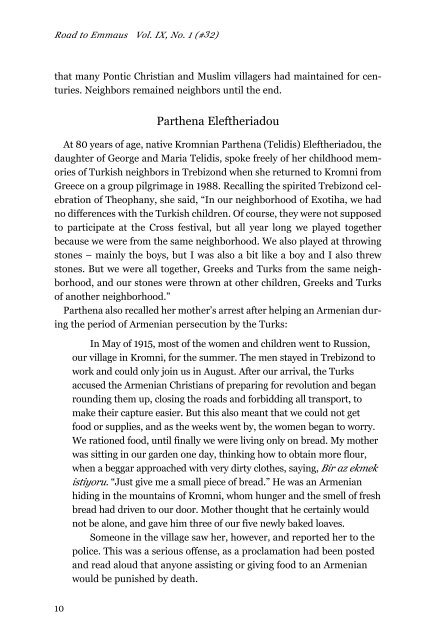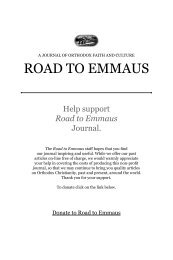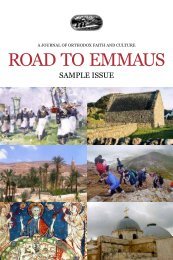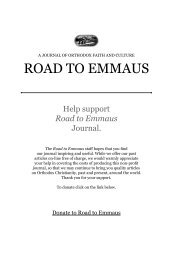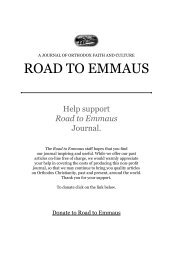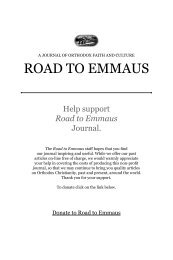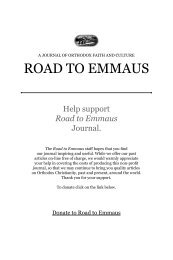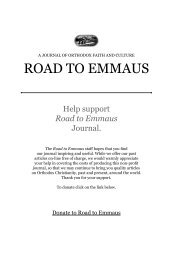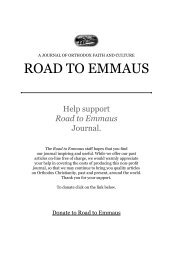Banished Faith: The Exile of Christian Pontus - Road to Emmaus ...
Banished Faith: The Exile of Christian Pontus - Road to Emmaus ...
Banished Faith: The Exile of Christian Pontus - Road to Emmaus ...
You also want an ePaper? Increase the reach of your titles
YUMPU automatically turns print PDFs into web optimized ePapers that Google loves.
<strong>Road</strong> <strong>to</strong> <strong>Emmaus</strong> Vol. IX, No. 1 (#32)BANISHED FAITHthat many Pontic <strong>Christian</strong> and Muslim villagers had maintained for centuries.Neighbors remained neighbors until the end.Parthena EleftheriadouAt 80 years <strong>of</strong> age, native Kromnian Parthena (Telidis) Eleftheriadou, thedaughter <strong>of</strong> George and Maria Telidis, spoke freely <strong>of</strong> her childhood memories<strong>of</strong> Turkish neighbors in Trebizond when she returned <strong>to</strong> Kromni fromGreece on a group pilgrimage in 1988. Recalling the spirited Trebizond celebration<strong>of</strong> <strong>The</strong>ophany, she said, “In our neighborhood <strong>of</strong> Exotiha, we hadno differences with the Turkish children. Of course, they were not supposed<strong>to</strong> participate at the Cross festival, but all year long we played <strong>to</strong>getherbecause we were from the same neighborhood. We also played at throwings<strong>to</strong>nes – mainly the boys, but I was also a bit like a boy and I also threws<strong>to</strong>nes. But we were all <strong>to</strong>gether, Greeks and Turks from the same neighborhood,and our s<strong>to</strong>nes were thrown at other children, Greeks and Turks<strong>of</strong> another neighborhood.”Parthena also recalled her mother’s arrest after helping an Armenian duringthe period <strong>of</strong> Armenian persecution by the Turks:In May <strong>of</strong> 1915, most <strong>of</strong> the women and children went <strong>to</strong> Russion,our village in Kromni, for the summer. <strong>The</strong> men stayed in Trebizond <strong>to</strong>work and could only join us in August. After our arrival, the Turksaccused the Armenian <strong>Christian</strong>s <strong>of</strong> preparing for revolution and beganrounding them up, closing the roads and forbidding all transport, <strong>to</strong>make their capture easier. But this also meant that we could not getfood or supplies, and as the weeks went by, the women began <strong>to</strong> worry.We rationed food, until finally we were living only on bread. My motherwas sitting in our garden one day, thinking how <strong>to</strong> obtain more flour,when a beggar approached with very dirty clothes, saying, Bir az ekmekistiyoru. “Just give me a small piece <strong>of</strong> bread.” He was an Armenianhiding in the mountains <strong>of</strong> Kromni, whom hunger and the smell <strong>of</strong> freshbread had driven <strong>to</strong> our door. Mother thought that he certainly wouldnot be alone, and gave him three <strong>of</strong> our five newly baked loaves.Someone in the village saw her, however, and reported her <strong>to</strong> thepolice. This was a serious <strong>of</strong>fense, as a proclamation had been postedand read aloud that anyone assisting or giving food <strong>to</strong> an Armenianwould be punished by death.My mother was taken <strong>to</strong> the court in Adassa, where the judgedemanded <strong>to</strong> know why she had helped the Armenian. Her deathseemed certain. But my mother was clever: “Your Honor, I did not knowthat the beggar was an Armenian. Even if it was written on his foreheadthat he was an Armenian, I wouldn’t know, because I can’t read orwrite.” After a lecture against helping bad people, the judge set her free.Others were not so fortunate. One prominent Greek <strong>of</strong> Trebizond, AchillesLazaridis, hid an Armenian friend, Agop, in his cellar and <strong>to</strong>ld him not <strong>to</strong>leave. Agop, however, believed the lies the Turks spread that any Armenianturning himself in would be sent back <strong>to</strong> Greater Armenia, and when he didso, he was not only captured and executed, but Achilles as well. When S<strong>of</strong>iaLazaridou opened her door the next morning, she found her husband’s headand dismembered body in a sack on her doorstep.Parthena Eleftheriadou continues:For us in Kromni, the weeks went by, but the roads remained closed.In Russion, we gathered all the flour from every house and made breadfor the whole village. <strong>The</strong> situation was serious because autumn wasapproaching and soon there would be snow in the mountains.Near Russion was a village called Molali, which was all Muslim, butwe did not feel them <strong>to</strong> be strangers, nor did they feel us so. We werecompatriots and the Pontian dialect was also their mother <strong>to</strong>ngue. Oneday the elder women <strong>of</strong> Molali came <strong>to</strong> discuss with our elder womenwhat was <strong>to</strong> be done. <strong>The</strong> Molali women proposed that the women andchildren <strong>of</strong> both villages go down <strong>to</strong> Trebizond <strong>to</strong>gether by back roads.At that time there were many thieves and resistance fighters in thosemountains, as the political disturbances enabled them <strong>to</strong> prosper, butthe women <strong>of</strong> Molali thought that if both villages went <strong>to</strong>gether, if wewere set upon by <strong>Christian</strong> robbers, we could protect the Muslim neighbors,and if there were Muslim robbers, the women <strong>of</strong> Molali could protectus. <strong>The</strong> proposal was logical and it was agreed upon.<strong>The</strong> two villages collected what supplies they still had and set ou<strong>to</strong>n the 130 kilometer trek. <strong>The</strong> first night we slept out under the openskies. <strong>The</strong> next day most <strong>of</strong> our way was green and heavily forested,but the last part was somewhat open and barren. We hurried <strong>to</strong> reachthe next forested area, but suddenly someone jumped out at us with agun, shouting loudly in Turkish, “Dur!” that is, “S<strong>to</strong>p”. My mother was1011


